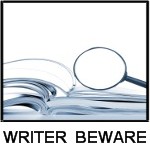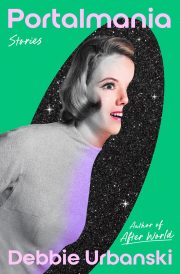The Brit Writers Awards: Questions and Threats
Posted by Victoria Strauss for Writer Beware
 Last December, I blogged about the Brit Writers Awards, an awards program for first-time authors, which was dogged by allegations of loose judging standards and poor communication. (Max Dunbar’s blog provides a summary of some of these allegations.) I was especially worried about the BWA’s Publishing Programme, which offered unpublished writers mentoring and publishing for £1,795 apiece. (Nearly a year later, I can find no mention on the BWA website of this program.)
Last December, I blogged about the Brit Writers Awards, an awards program for first-time authors, which was dogged by allegations of loose judging standards and poor communication. (Max Dunbar’s blog provides a summary of some of these allegations.) I was especially worried about the BWA’s Publishing Programme, which offered unpublished writers mentoring and publishing for £1,795 apiece. (Nearly a year later, I can find no mention on the BWA website of this program.)
I wasn’t the only person with concerns. Jane Smith of How Publishing Really Works and author Claire King also weighed in, and last February, the UK’s Writing Magazine withdrew from its association with the BWA, citing concerns over the judging process and a lack of transparency.
Now more questions have arisen.
A couple of weeks ago, Claire King received an email from the BWA announcing a literary agent referral program through its new Agent Division (Claire has posted the text of the email on her blog). According to the email, “a number of partner agents have asked us to help them identify potential literary gems to save them ploughing through their slush pile.” Writers were invited to submit a synopsis and samples, which the BWA would then “consider” for a referral.
Are such programs (and the BWA’s is not the only one) worthwhile? Not in my opinion. Literary agents are already the middlemen of the publishing world; as such, they expect to be approached by writers directly, and there’s really no need for an intermediary to add another layer to the process. Plus, as tempting as it may seem to have someone else do the work for you, it’s far more effective to control the process yourself, since you know your own work best and thus can best research and choose whom to approach.
More specifically, as Jane Smith points out, the BWA doesn’t identify the agents it’s working with–which means that writers have no way of verifying the agents’ track records and reputations. Also, the list of requested genres includes “Short stories and Poetry for anthologies,” material that reputable literary agents usually don’t consider–which raises still more questions about the usefulness of this service.
Jane continues:
Some of the members of Harry Bingham’s Word Cloud sent their work in and have now heard back from the BWA, and this is part of the message they’ve all received:
from what you have submitted, the assessors could not refer your work to agents immediately, but they see great potential here. The issues highlighted above can be rectified easily, so before you go any further with this, we suggest that you need a consultancy to advice on your synopsis, positioning the book for an agent/publisher, highlighting USPs and ensuring that the main plots are woven into the synopsis which also needs some basic formatting. We believe this will encourage the agent/publisher to read on to see its true potential.
You need to find an experienced literary consultant/marketing expert that can help you with this. There are many providers out there and it shouldn’t cost very much but it’s important to find the right person that knows what agents/publishers are looking for. Please do not have it edited at this stage, as this is not required. If you would like us to arrange this for you, please let me know immediately.
(The bolding is Jane’s.) So in addition to offering referrals to literary agents, is the BWA also offering referrals to literary consultants? If so, this is odd–I can’t think of any industry expert who’d suggest that writers hire a literary consultant to tweak their synopsis. Also, if the BWA is providing consultant referrals, what’s the relationship–if any–between the BWA and the consultant(s)? Transparency is extremely important here, since, even though such a program may be perfectly above-board, referrals of this sort have been extensively abused over the years.
If you tried clicking the link in that quote from Jane, you’ll note that it leads to a deleted page. Here’s why: Harry Bingham received a threat of legal action from BWA’s solicitors. (He has since received another.) And when Claire King wrote to the BWA (at the BWA’s own invitation) with a list of questions, she was told that “this matter is now being investigated and dealt with by our solicitors and they will be contacting you.”
One has to wonder why the BWA has chosen to address the situation in this manner. Whatever bad press may be generated by skeptical bloggers–and despite the questions that have been raised about the BWA’s structure and operations, I’m not aware that anyone has accused it outright of dishonesty–the kind of publicity created by attempting to silence critics with legal threats is orders of magnitude worse.
Today, still under threat, Harry Bingham posted a series of questions for the BWA about the Agent Division and the BWA in general. He concludes:
In short, I know tremendously little about the BWA and its operations, and have no reason to think that its activities are any less honourable than our own. If its model is non-conventional, that’s fine too.
On the other hand, the torrent of internet gossip and implication threatens the BWA’s reputation and, to some degree, the reputation of all those who, like the Writers’ Workshop, do their damndest to help the new writer.
In conclusion – and here I’m addressing the BWA / Brit Writers directly – your current non-disclosure of information is, in my view, causing legitimate concern amongst the community of new writers. We will always vigorously champion any organisation or initiative which helps the new writer. I hope we can champion you. But at present we need some answers. I invite you to supply them.
Hopefully the BWA will respond.


